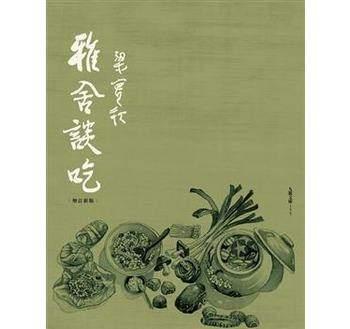Wanderers can't stop worrying about home, and foodies can't stop worrying about the taste of their hometown. It is said that there is no Yu cuisine in the eight major cuisines in China, which has certain historical reasons, not to mention, let's first take a look at this famous Yu cuisine restaurant that many Henan people do not know. The advance statement is purely with the love of food and the spirit of curiosity about history, and refuses to advertise.
Mr. Liang Shiqiu is a famous literary scholar and also a "gourmet" (the highest realm of foodie). In his "Yashe Talks About Eating", he wrote about many of the catering things he personally experienced, and also talked about a Yu restaurant many times, as well as anecdotes in the store and the famous dishes and famous points in the store. Mr. Liang wrote: "At the time of the opening of The Houdefu Restaurant, coinciding with the collapse of the imperial system and the beginning of the establishment of the Republic of China, when Yuan Shikai was in power, he liked to treat guests with Henan cuisine, and over time, some officials and eunuchs also voted for their favor and competed to emulate it, making HouDefu famous and prosperous. The original, small second floor could not receive the diners who came one after another, but the old site of feng shui relations would never be moved, and it would not be renovated, and it would look old and simple for decades. In order to expand its business, semicolons have been opened in Beiping's Chengnan Amusement Park, Shenyang, Changchun, Heilongjiang, Xi'an, Qingdao, Shanghai, Hong Kong, Chongqing, Beibei and other places. One by one, the senior disciples under The Chen Treasurer were sent to various places to take charge of the semicolon. This is a brief history of Hou Defu. ”

This Yu restaurant named Hou Defu was very popular during the Republic of China period. In the fifteenth year of the Republic of China (1926), the Beijing Morning Post once wrote: "The famous yu restaurant in Beijing is Hou Defu of Dashilar, and the dishes are 'tile fish', 'braised mussels', 'bone-breaking meat', 'walnut loin', 'crispy kelp', and 'air-dried chicken'. Its pasta is homemade and delicate. The mooncakes made are date paste, bean paste, roses, ham, excellent taste, and can go far, and the southern tea shops, very different. In the heyday of the Republic of China, Hou Defu opened more than a dozen branches, and the storefront expanded to Shanghai, Tianjin, Harbin, Xi'an, Qingdao, Chongqing, Nanjing, Changchun, Shenyang and other places.
Lu cuisine surrounds the Yu restaurant that rises in the middle
In the last years of the Qing Dynasty, only Lu cuisine entered the city of Beijing. "Chinese Cuisine" once recorded: in Beijing's famous restaurant, what hall, residence, building, spring and the like, from the treasurer to the guy, seven out of ten is a Shandong person, the master chef in the kitchen is a Jiaodong accent. In the siege of Lu Cai, there is a Henan restaurant that kills a blood road, and this one is Hou Defu. Chen Liantang, the founder of Hou Defu, is a native of Qixian County, Henan Province, chen Liantang came to Beijing as a teenager, worked in a restaurant, and later learned to cook and became proficient in cooking. In 1902, Chen Liantang founded Hou Defu, a specialty of Henan cuisine, in a large fence in Beijing.
The fate of one person determines the rise and fall of the restaurant
The newly opened HouDefu business is not very good. However, a person appeared, and his rise changed the fate of Hou Defu and also affected the course of China's history to a certain extent. That's right, it's Yuan Shikai. Yuan Shikai likes to eat fish, the most favorite is the Yellow River carp, and his favorite fish dish is slippery fish baked noodles. This is a famous dish in Henan, made with sweet and sour sauce, also known as sweet and sour fish baked noodles, or soft Yellow River carp roasted noodles.
Yuan Shikai's influence gradually increased, naturally also increased the fame of Henan cuisine, for a time as a Henan restaurant Hou Defu became a gathering place for dignitaries and nobles, and the business suddenly improved. In 1912, because Yuan Shikai did not want to go to Nanjing to serve as the president, he instigated Cao Kun to launch a mutiny, which caused the restaurant to be robbed, and soon after resumed business again. In 1916, Yuan Shikai was proclaimed emperor, and Hou Defu even borrowed the signboard of "Henan people" to create public opinion, becoming a well-known restaurant in Beijing at that time. However, Yuan Shikai claimed that the emperor was forced to abolish the imperial system after 83 days, and then died of illness. Although Hou Defu once borrowed the fame of Yuan Shikai, his own craftsmanship was exquisite and he was not greatly affected, and he was still ranked as a famous restaurant in the capital.
Hou DeFu Restaurant makes good use of cooking techniques such as grilling, "fire leaning", frying, braising, stewing, stir-frying, and honey juice to make dishes. The famous dishes of the town shop include peony swallow dish, roasted skin elbow, and special dishes include iron pot eggs, sweet and sour tile fish baked noodles, honey gourd, purple gas Donglai and so on.
After several suspensions, it has been prosperous for a long time
In the early days of the founding of the People's Republic of China, Hou Defu was once closed for business, but reopened in 1962 in Sanlihe, Xicheng District, Beijing. During the Cultural Revolution, it was renamed Henan Restaurant. In 1988, when it was moved to Beijing Nanlishi Road to open, the original name of the century-old number was restored- Hou Defu, and the famous calligrapher Liu Bingsen personally wrote the plaque. The existing business area of more than 4,000 square meters, and has business dealings with Zhengzhou Catering Service Company.